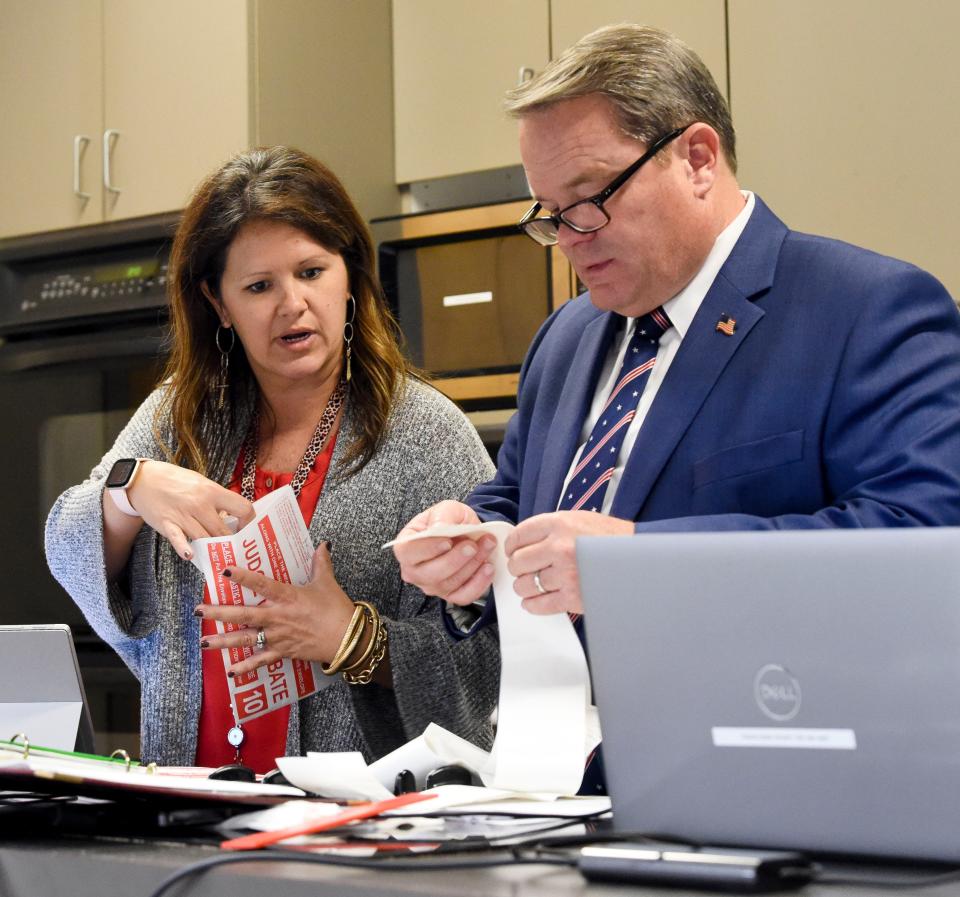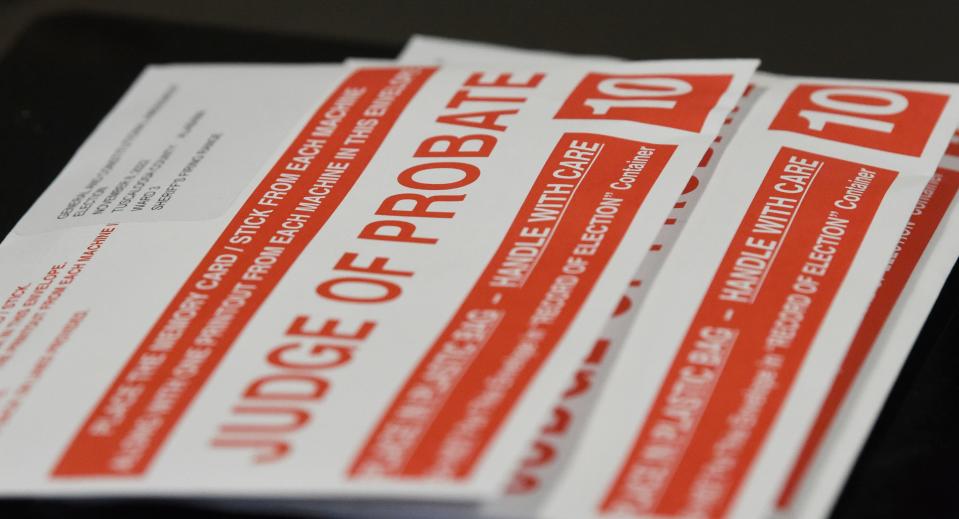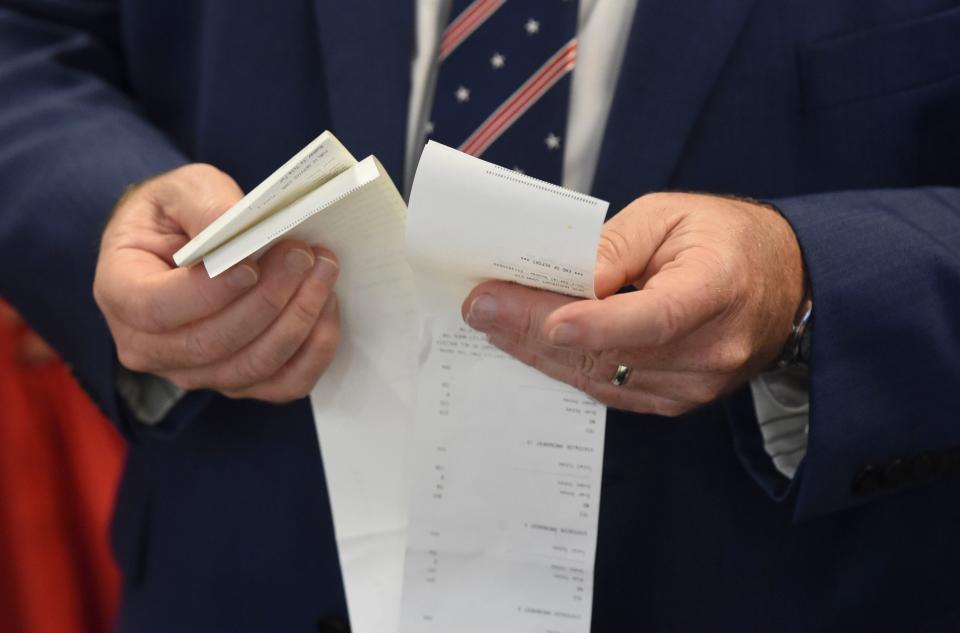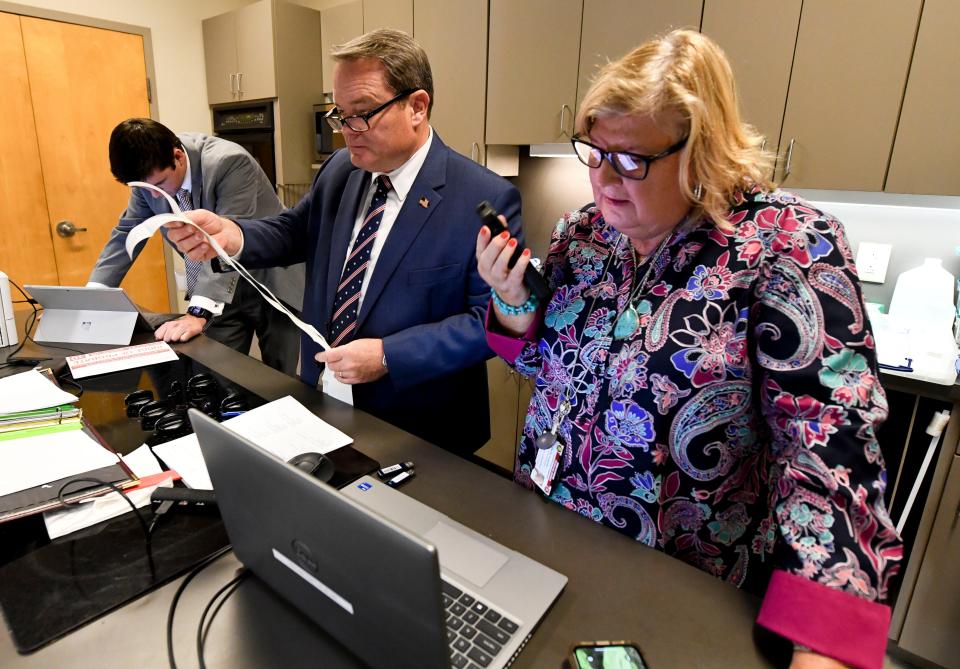Probate judge: Tuscaloosa County's Super Tuesday voting should be 'quick and painless'
Voting across Tuscaloosa County's 54 polling locations should not only be secure and accessible for Super Tuesday, but a comfortable, pleasurable experience, said Probate Judge Rob Robertson, one of the officials entrusted with making that come true.
"Standing in line, I thoroughly enjoy it," Robertson said. "We're all out there getting to cast our vote, which is such a precious right.
"Someone may vote completely opposite of what I'm voting for, but that's great. That's what we're out there to do."
NICK SABAN COMMEMORATIVE BOOK: Relive Nick Saban’s epic Alabama football coaching career with our special book! Preorder here.
Lines may be longest early and late on Super Tuesday, March 5, but the hope is voters can be in and out of most locations within 20 minutes. Polling places will be open from 7 a.m. until 7 p.m. Even if lines should linger, voters should hang in: anyone who's in line by 7 p.m. will be able to vote, no matter how long it might take.
Check-in eats up the most time, typically, but that should be smoother this year, thanks to updated scanning tech. Most voters present a driver's license, or free state-issued ID, and scanners read in the card's codes.
"Every time we have an election it seems there's something new, a little piece of technology changed," Robertson said. This year it's newer tablet-based check-in, top of the line, he said. Optical readers eliminate human error, making sure the right person gets the right ballot: Tuscaloosa County has eight different ballot styles due to district lines. There's also a paper ballot backup for added clarity and security.

The probate judge, sheriff's office and circuit clerk have zero tolerance for voter intimidation, or campaigning infractions, Robertson said. If complaints come, the sheriff will dispatch a unit to clear up the situation.
"I've been in office since 2019, and in that time we've had no real security issues," he said. "But we always have to be on guard, have to make sure we follow procedures."
Keeping elections secure
Despite perceptions about unsecure elections, that's not really the case, here or nationally. Federal, state and local procedures create layers that can't easily be penetrated, or perpetrated, with numerous studies proving the tiny percentage of irregularities — mostly due to clerical or database errors — in the U.S. ranks between 0.0003% and 0.0025% incident rates.
"We hear a lot of stuff that floats around about elections," Robertson said. In addition to countering with the facts, he'll said he'll sometimes offer to a claimant: "How about you come be a poll worker?"

About 500 poll workers are needed to cover Tuscaloosa County election days and they are trained according to state law. Many here are seasoned veterans, having worked numerous years. Others are being trained now; there are pushes on to urge veterans and students to serve. With an ongoing high-school internship program, for those 16 and above, students never touch the ballots, but can expedite lines, work 7 a.m. until 7 p.m. on an election day — getting a day off from school — and to boot better learn their community, and voting processes.
"Anyone who becomes a poll worker can learn how things work, see all the redundant safeguards in place," Robertson said.
For anyone who claims voter fraud is rampant, despite factual evidence to the contrary, serving as a poll worker should dispel fears. "I think you'd walk away from that feeling very different about this process," he said.
According to 2024 Alabama statistics, Tuscaloosa County has 149,428 registered voters, the sixth-largest number, behind Baldwin, Jefferson, Madison, Mobile, Montgomery and Shelby counties. Tuscaloosa is the second-largest county in Alabama by total area, with about 1,322 square miles, behind only Baldwin's 1,589. Our 54 polling places range in size from the Bobby Miller Center, one of the state's largest with more than 10,000 registered voters, down to tiny rural spots designed to make easier access for those far outside city limits.
Like elsewhere in the state, Tuscaloosa often suffers abysmal turnout rates. Tuscaloosa's numbers were about 3.1% for the May 2022 primary election, and 2.6% for the 2022 primary runoff; the state average for those was 2.9%. More voters do get involved during presidential races, though numbers are still shockingly low: For the 2020 general election, Tuscaloosa County had a 14.3% voter turnout, to the state's 13.1%.

"Sadly, there's a good bit of voter apathy. It runs rampant everywhere," Robertson said. On Nov. 5, 2024, the presidential race, and a possible gambling proposition, should draw greater numbers.
But voters should not overlook any elections, he said.
"So many folks have fought and died to keep this right," Robertson said.
Fighting for voting rights
Former Texas congressman and Democratic political activist and writer Beto O'Rourke, who will be in Tuscaloosa Feb. 29 to speak about just that — histories of people who fought and died to maintain the right to vote — has heard apathetic responses across the vastness of Texas.
"I used to be on this high horse: If you don't vote, you get what you deserve. You don't have the right to complain or speak about things," O'Rourke said, in a phone interview before the Tuscaloosa stop built around his book "We've Got to Try: How the Fight for Voting Rights Makes Everything Else Possible."
He's changed that, though, trying to acknowledge that people have made what is not, given numerical unlikelihood of their votes making differences, an irrational or illogical choice. Because Texas has eliminated 750 polling places, mostly in Black or Hispanic neighborhoods, he said, voting lines can stretch seven or eight hours long.
"And some people are just not going to undergo that," O'Rourke said. Instead of arguing against them, he argues for those histories in his book, people who struggled for decades to defend and secure voting rights.
"We are heirs to that sacrifice and that struggle. We must make the most of this inheritance," he said.

In states such as Alabama — home to the 2013 Shelby v. Holder, which "gutted the Voting Rights Act of 1965" ― and Texas, systematic voter suppression and intimidation are far deeper concerns than voter fraud, he said.
"In Texas, within minutes of (the Supreme Court's decision in Shelby v. Holder), they literally implemented the strictest voter ID law in the country," O'Rourke said. Add in all the structural closings, and gerrymandering, and it's little wonder people despair.
"But if the alternative is just to let this country continue to roll toward the cliff ... are we going to be 1890, and turn our back on the problem, or are we going to be 1965 and stand up?" he said. "People such as John Lewis literally put their lives on the line for the country."
The ongoing fight for voter rights is "the biggest test of our lifetimes," O'Rourke said. "One we cannot fail."
Robertson emphasized how the county maintains transparency, how figures are posted as fast as possible, in real time, both on polling place walls, and on the probate judge's website.
"We do them in batches," he said. "We don't wait until the end and then send it all. ... Literally every polling place has (numbers) printed, and stuck on the wall before everyone leaves." Figures are then uploaded and sent to the secretary of state.
"We get them out fast as we can, to let people know how an election's turned out," he said.
All these procedures, and more that goes on in leading up to, and following, election days, are in place to make the voting experience as quick and painless as possible.
"Vote how you're going to vote, but please vote.Your vote is going to get counted," Robertson said.
"You are going to have your say."
Reach Mark Hughes Cobb at mark.cobb@tuscaloosanews.com.
This article originally appeared on The Tuscaloosa News: County's 54 polling places up to date on technology, Robertson says

